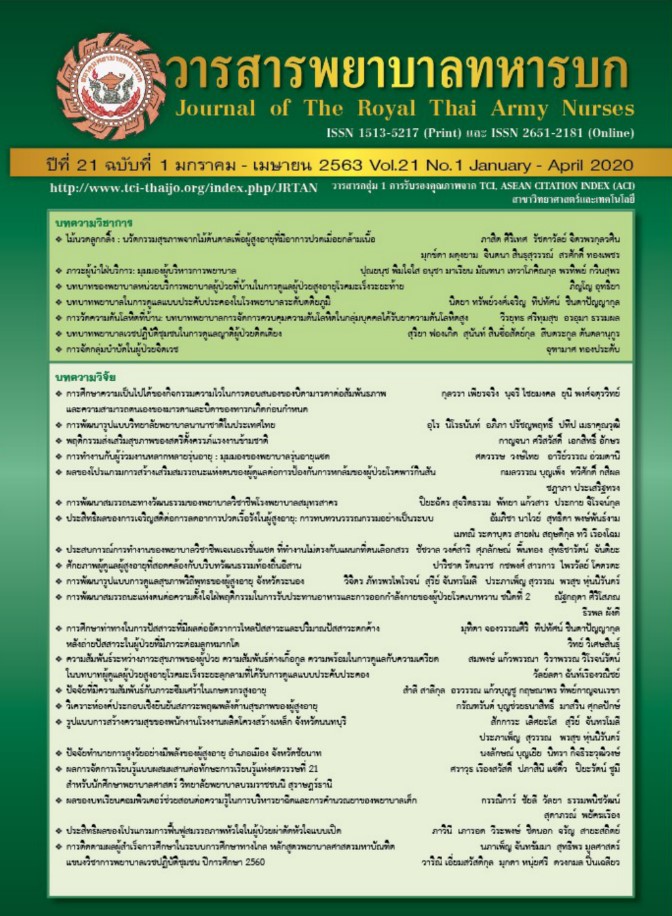Job Burnout of Generation Y Professional Nurses at a Government Hospital
Keywords:
Government Hospital, Generation Y, Job Burnout, Professional NurseAbstract
The purposes of this mixed-methods research were: 1) to investigate job burnout and its related factors of generation Y professional nurses at a government hospital, 2) to compare job burnout among classified by departments, and 3) to explore a guideline for their job burnout management.
The samples comprised 2 groups: 1) 112 nurses who answered questionnaires and were selected by systematic random sampling, and 2) fourteen nurses who attended focus group discussion and were selected by purposive sampling. Research tools which were done for content validity with 0.8-1.0 included: 1) a job burnout questionnaire and 2) A question guideline for focus group discussion with reliability 0.94. Research data were analyzed by frequency, percentage, mean, standard deviation, and content analysis.
The results showed. 1) Generation Y professional nurses rated their job burnout overall at the low level. With itemized scores, emotional exhaustion dimension was at the moderate level; while, depersonalization and decreased occupational accomplishment dimensions were at the low level. 2) Professional nurses of special unit groups and the Inpatient unit significantly rated their burnout higher than the Outpatient department at the level .05. 3) Related factors included work overload, staff nurse shortage, working beyond the standard criteria, head nurses’ lack of understanding staff, difficulty of exchanging shifts, insufficient equipment. Finally, 4) The guideline for their burnout management comprised documentation workload reduction, providing sufficient nursing staffing, setting job priority, working quicker, increasing communication channels with supervisors, adequate supply management, additional remuneration for personnel with more workload, good relationship, and positive thinking.
Downloads
References
2. Mc Connell, E.A. The Burnout syndrome. In E.A. McConnell (Ed.), Burnout in the Nursing Professional: Coping Strategies, Causes and Costs.St.Louis: C.V. Mosby. 1982.
3. Muldary, T. W. Burnout and health professionals: Manifestations and management. San Jaun Capistrano, CA: Capistrano Press. 1983.
4. Brunetto Y., Wharton R F., & Shackloc K. Communication, training, well-being, and commitment across nurse generations. Nursing Outlook. 2012;60 (1):7-15
5. Sirisan, M. Expectations of Working Together between Supervisors and Generation Y Subordinates. Thammasat University. 2011. (in Thai)
6. Jamieson, I., Kirk R. C., & Andrew C. Work-Life Balance: What Generation Y Nurses Want. Nurse Leader. 2013;11 (3):36-9.
7. Zhou, B. Factors Affecting Nurses’ Work Burnout : A Case Study of Bangkok Metropolitan Authority’s Medical College Hospital and Vajira Hospital. 2010.(in Thai)
8. Panchuwong T, Bunlikitkul T, Fatigue and Fatigue Management during the Fundamentals of Nursing Practicum for Nursing Students at the Thai Red Cross College of Nursing. Thai Red Crose Nursing Journal. 2010. (in Thai)
9. Theucksuban, B. Factors influencing job burnout among profassional nurses in Maharajnakornsrithammarat hospital. Thai Journal of Nursing Council Vol. 23 No.4 October-December, 2008. (in Thai)
10. Wu, S., et.al. Relationship between burnout and occupational stress among nurses in China. Journal of Advaced Nursing homepage. 2007.
11. Setkit, R. Factors Affecting Burnout of Professional Nurses at Regional Hospitals in Regional Health 5. The 5th STOU Graduate Research Conference. 2014; 5,10- 11. (in Thai)
12. Sumdaengrit, B., & Lohacharoenvanich, N. Expectation and Perception of Nursing Service Quality of Clients at Gynecological Outpatient’s Department in University Hospital. Journal of nurses’ association of thailand, north-eastern division. 2013;161-168. (in Thai)
13. Inklub,L. Burnout syndrome in the nursing profession and solutions for individuals. Nursing Journal (October-December). 1985; 24 (4): 415-426. (in Thai)
14. Yatbuntong, J. The relationships between selected factors and burnout level of professional nurses in governmental hospitals, Bangkok metropolis.1986. (in Thai)
15. Freudenberger, R. H. The staff burnout syndrome in alternative Institutions. Psychotherapy: Theory, Research and Practice.1975;11(3):73-78.
16. Greenglass, E. R., Burke, R. J., & Fiksenbaum, LWorkload and burnout in nurses. Journal of community & applied social psychology. 2001;11(3),211-215.
17. Sangtong, N. Stress and Job Burnout Reduction Among Professional Nurse of Samut Sakhon Hospital. 2010. (in Thai)
18. Sawaengdee, K. Situation of professional nurses in Thailand. System Research Journal public health. 2008;2 (1), 40-48. (in Thai)
19. Chaubankoh, S., Cheevakasemsook A., & Oumtanee A. A Study of Trait Components of Generation Y Thai Professional Nurses, Regional Hospitals of 5th Regional Health Authority. Journal of the Royal Thai Army Nurse. 2017;18 (supplement):155-162. (in Thai)
20. Koonpool, P., Noimuenwai, P., Prasertsri, N. A Study of Leadership of Head nurse in Management for Generation Y nurses. Journal of The Royal Thai Army Nurses. 2019;20(1): 178-180. (in Thai)
21. Hendricks, J. M., & Cope, V. C.. Generational: What nurse managers need to know. Journal of Advanced Nursing. 2012; 69 (3):717-25.
22. Maslch, Schaufeli, Leiter. Job Burnout. Psychology Department, University of California, Berkeley, California 94720-1650. 2001.
23. Jaiboon, P. The Proportion and Causes of Resignation of Nurses from Srinagarind Hospital, Khon Kaen University. 2011. (in Thai)
24. Srisuphan,W., & Sawaengdee, K. Policy proposals for solving nursing shortage problems Profession in Thailand. Journal of Nursing Council. 2012; 27(1): 5- 12. (in Thai)
25. Somboon, P. Factors Influencing Job Retention of Temporary Nursing Employees in the Northeast Army Hospitals. Journal of The Royal Thai Army Nurses. 2018; 19(1):164-170. (in Thai)
Downloads
Published
How to Cite
Issue
Section
License
บทความหรือข้อคิดเห็นใดใดที่ปรากฏในวารสารพยาบาลทหารบกเป็นวรรณกรรมของผู้เขียน ซึ่งบรรณาธิการหรือสมาคมพยาบาลทหารบก ไม่จำเป็นต้องเห็นด้วย
บทความที่ได้รับการตีพิมพ์เป็นลิขสิทธิ์ของวารสารพยาบาลทหารบก
The ideas and opinions expressed in the Journal of The Royal Thai Army Nurses are those of the authors and not necessarily those
of the editor or Royal Thai Army Nurses Association.






